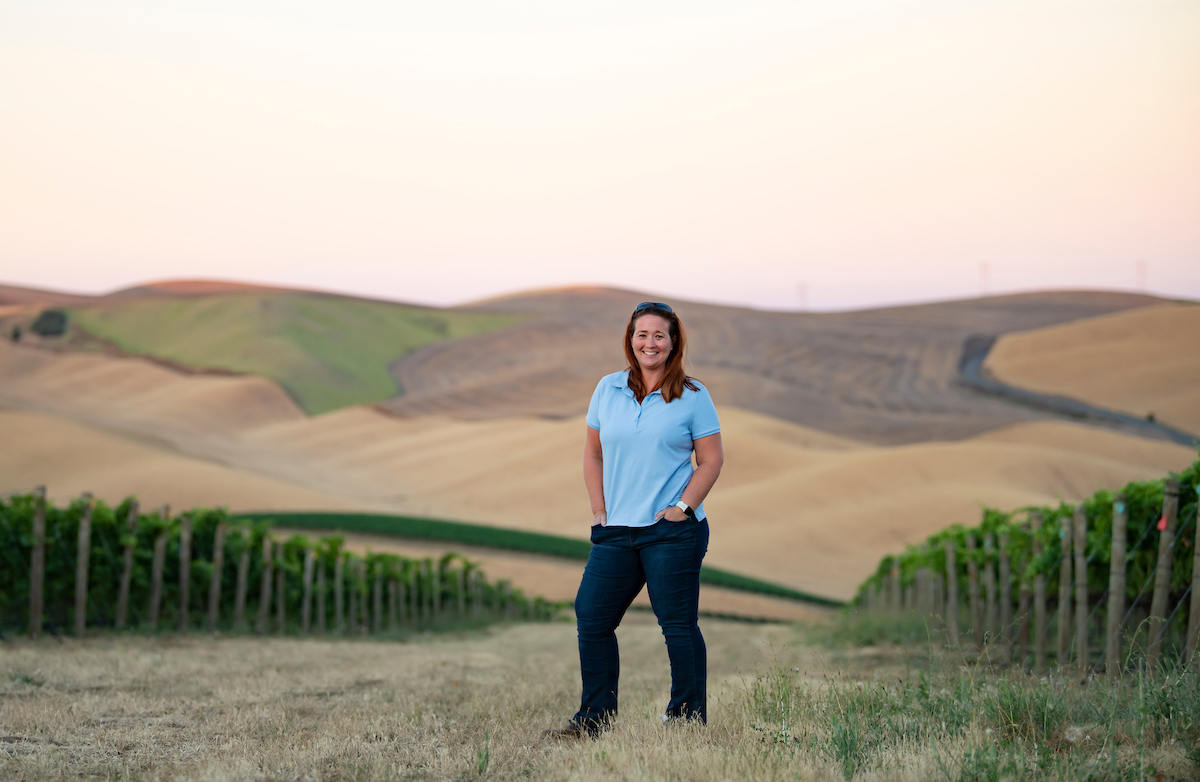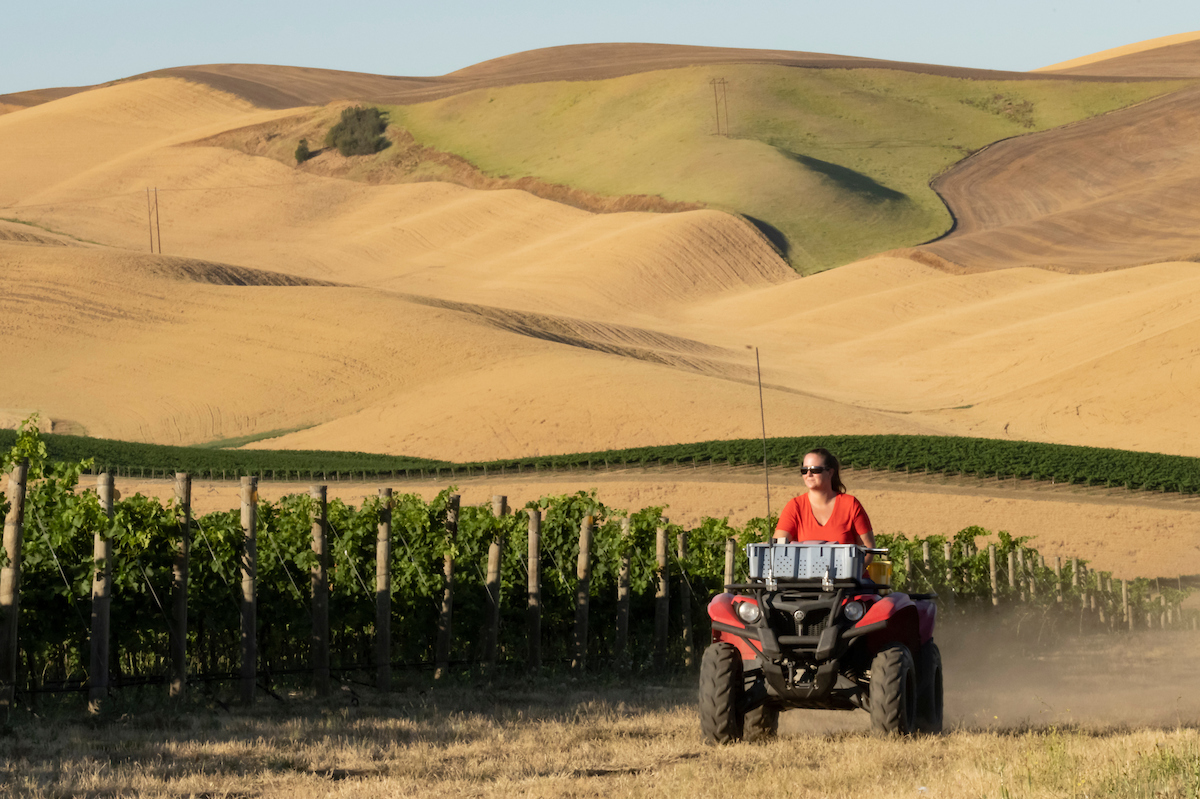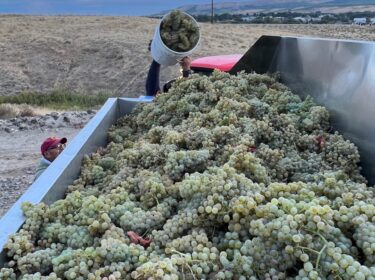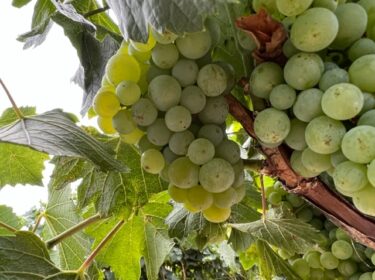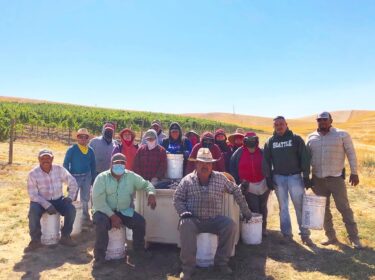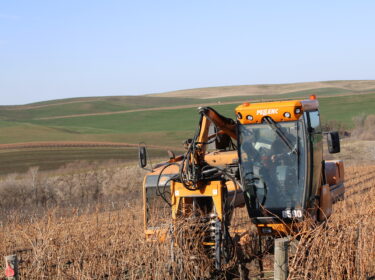“No hay nada fuera de esto, soy yo.”
Meet Brittany Komm, Senior Viticulturist for Precept Wine and Vineyard Manager for Waterbrook and Browne Family Estate Vineyards in Walla Walla. Brittany grew up in Wenatchee, WA, the “self-proclaimed apple capital of the United States,” as she told us. For Brittany, that moment of knowing she wanted to work in wine just so happened to be during a cheerleading practice in high school, when she saw a teammate’s mother drive up in a truck with an ATV in the back. “What’s your mom do?” Brittany asked her friend. “She’s a field woman. She’s out in the orchards scouting for pests.” And that’s when she knew: “I want a job like that,” Brittany recalls thinking. Fast forward two-plus decades, Brittany is proud to have an ATV in her truck, especially because she oversees just north of 1,000 acres of estate vines.
Even through the most stressful times, I still love what I do. I wouldn’t change careers for anything.—Brittany Komm
Translated by Melany Meza
Washington Wine: What you just said, “There is nothing outside of this. This is me,” made me think about what David Rodriguez, another ambassador, said: “There isn’t a point in the day when I’m not a farmer.”
Brittany Komm: Exactly. I was talking to my doctor recently. We are working through some stuff right now that has been brought on by farming. It takes a toll on your mental and physical health, and I don’t think a lot of people realize that. And even doctors, they don’t understand our world, per se.
I was trying to tell them that for six months out of the year, I’m on. There is no time to think about “me.” There is no “me time” for six months out of the year. And after harvest, we have six months of somewhat slow time. We really only have about two months of actual inactive time. But those six months, I can focus on me a little bit more. I can focus on my mental health. I can focus on my physical health. I remember him saying, “Well, you have to find a way to take care of yourself all year around.” And I’m like, “You don’t get it. You don’t get it. I can’t.”
It’s not physically possible when your day starts at 4:00 or 5:00 in the morning and you’re going till 5:00 or 6:00 at night. I start crashing around 1:00 and when you have to limit your caffeine intake it can get challenging. I might not have kids, but I still have to come home and cook dinner, clean the house. There is no time for Brittany for at least six months out of the year. It takes a toll and people don’t realize it. I know it sounds like I am whining and crying about it, but I am not. I just want people to realize what kind of toll farming can take on a person. Farming isn’t for everyone. Even through some of the most stressful times I still love what I do, and I wouldn’t change careers for anything.
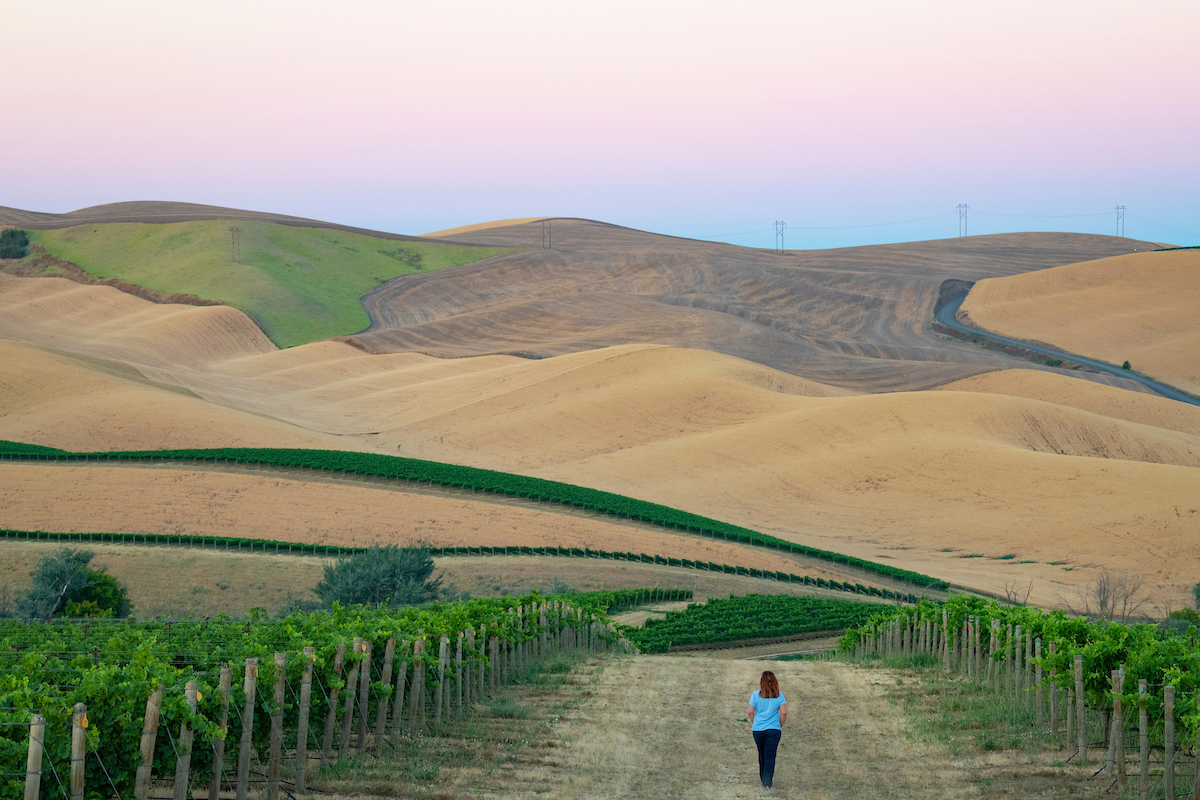
WW: Right. If it was a matter of drawing better boundaries, you probably would have done that.
Brittany: Exactly, I have told him that I tried drawing boundaries and it made things worse. It is easier to put the fire out when it first starts than to let it burn even overnight. And if I have somebody calling me at 6:00 at night, it’s because there’s a problem out there in the vineyard. And that’s not a problem I can ignore.
I think that’s something that can be said for this whole program, too: our lifestyles. Farmers are on 24/7. We have people running in vineyards 24/7 during certain time frames each year. It all depends on how nice Mother Nature is being. Things break down. Machines break down. We can have irrigation lines blow. We can have fires burning out of control approaching our vineyards; yes this has actually happened to us a few times. In the wintertime, it starts with fans for cold protection. In summer, we spray all night. It’s always something.
It all depends on how nice Mother Nature is being.—Brittany Komm
WW: It sounds like what’s hard is that the lifestyle is one, in a way, that you can’t predict. That that’s the only thing you can predict: nothing.
Brittany: In June and July during the heat wave, we were running irrigation 24 hours a day. Jaime, who is another one of the ambassadors, was sleeping between six-hour irrigation sets. I think that’s how often they had him changing water, and he was doing the 24 hours for, I think, a week. It’s things like that that people don’t realize that go on.
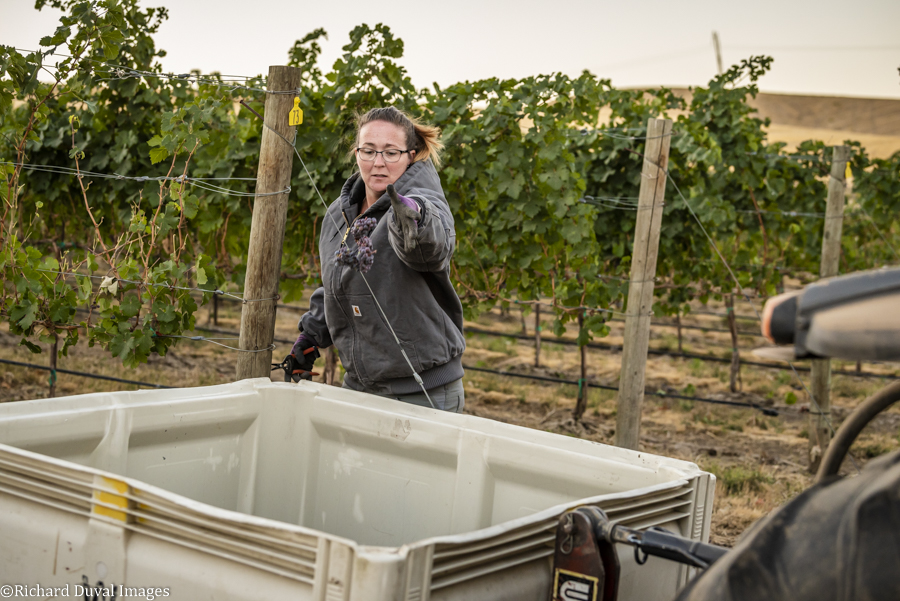
WW: We dove right into the conversation, but let’s back up. Tell us who you are, where you work, and what your slice of farming looks like.
Brittany: Day-to-day, my job title can change, but I am the Senior Viticulturist for Precept Wine, and Vineyard Manager for Waterbrook and Browne Family Estate Vineyards here in Walla Walla.
I specifically manage the Browne Family and Waterbrook Estate Vineyards here in Walla Walla. I make all the decisions on them, and I think that’s one of the big differences between a vineyard manager and a viticulturist: the vineyard manager makes all the decisions. I’m also the senior viticulturist for all of Precept’s other estate vineyards, as well as many of our contracted vineyards, so I assist our director in making decisions concerning all of our other vineyards. We work as a team on all other estate vineyards in making decisions. I am also unofficially, the Director of Vineyard Education for Precept. I will stop in and visit all the hospitality groups that come out to Canyon Ranch, where Washington Wine’s Road Trip is held every year; and teach them all about Washington vineyards.
I’ve really shifted our education program more towards the actual vineyard side. The only people that can truly explain the vineyard side of the industry are the people who eat, sleep and dream vineyards; the people that are in them every day. People are finally starting to realize that there is more to wine than just what happens in a winery.
The only people who can truly explain the vineyard side of the industry are the people who eat, sleep, and dream in the vineyards.—Brittany Komm
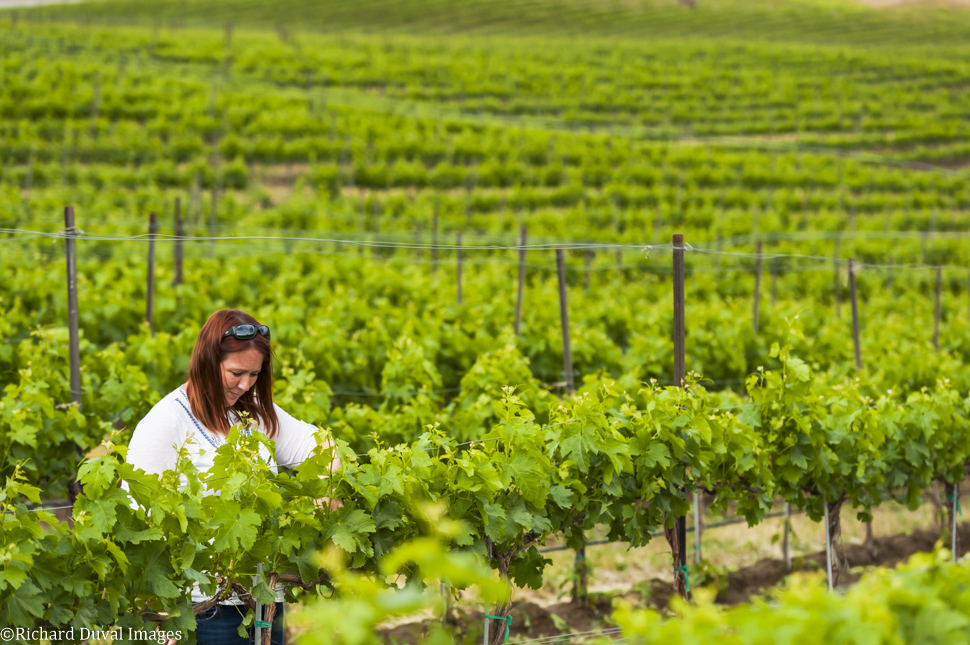
WW: Translate the scope of that for me: You’re a vineyard manager and senior viticulturist for this huge company and brands. What’s the picture we’re looking at?
Brittany: We have just north of a thousand acres of estate vineyards that I touch weekly. I used to be able to get into every single one of our vineyards on a weekly basis. That has changed as we have grown as a company as well as my role with the company expanding. We also have long-term contracts with many vineyards. I don’t spend as much time out there with those because they have their own management teams that are fantastic, but I will go out there a couple of times a year to ensure that everything is being done to specifications, or if there are problems, I’ll go out and see what’s going on. We also do Gruet the sparkling program for New Mexico, which has been super fun.
Between our three wineries in Washington, we processed around 1 million gallons of wine last year, which will produce just around 417,000 cases of wine. That is here in Washington alone, and I touch almost all the grapes that go into those (our Washington programs), except for some of our contracted stuff. But a lot of people they don’t know what or who Precept is, but they know the brands. They know Browne Family Vineyards, they know Waterbrook, they know Canoe Ridge. They don’t realize the House Wines that come in bottles, boxes and most popularly cans, are ours, too. Gruet sparkling, that’s ours. We’ve got Sagelands, Apex, Radius, and Primarius. We’ve got stuff that stretches down into Oregon, California and Idaho, and then we’ve actually got stuff over in Australia as well.
When I sit back to think about it, it blows my mind a little. I don’t have kids, but I have a lot of vines. They eat up all my attention. Some call me a weirdo, but I care for them like children. If they get sick—mildew, rot, pest damage—I want them to get better. If they get thirsty, I make sure they stay hydrated. They can also keep me awake at night worrying about them: winter time heat spells, etc. They’re getting ready to graduate to go to college here soon. I’m ready to kick them out of the nest. I’ve nurtured them for a while now. It’s time for them to leave us.
I grew up in Wenatchee, the self-proclaimed apple capital of the world.—Brittany Komm
WW: What was your journey into Washington and wine? How did you get to where you are now? Were you always a farmer or in farming?
Brittany: I was raised not necessarily in a farming family. My mom grew up in California, so she’s a California girl, but my dad was born and raised in Omak, Washington. Not a lot of people know Omak. It’s hick town. My dad was a farm kid, or country boy. His parents own a significant amount of acreage up there. They had various stone fruits, apples, peaches, nectarines, apricots. Some of my youngest memories are going up and visiting my grandparents in Omak, and being in orchards with them during harvest, and being on the tractor with my grandpa and my dad, interacting with the crews. They always loved it when the grandkids were around. And I just remember it being such a family-oriented event.
I grew up in Wenatchee, the self-proclaimed apple capital of the world. It gets confusing, but my freshman year of high school, I was a cheerleader. My former teammate’s mother came to pick her up, and I noticed her mom had an ATV in the back of her truck. I asked my friend what her mom did. She goes, “She’s a field woman. She’s out in the orchards scouting for pests.” And that’s when I knew: I want a job like that.
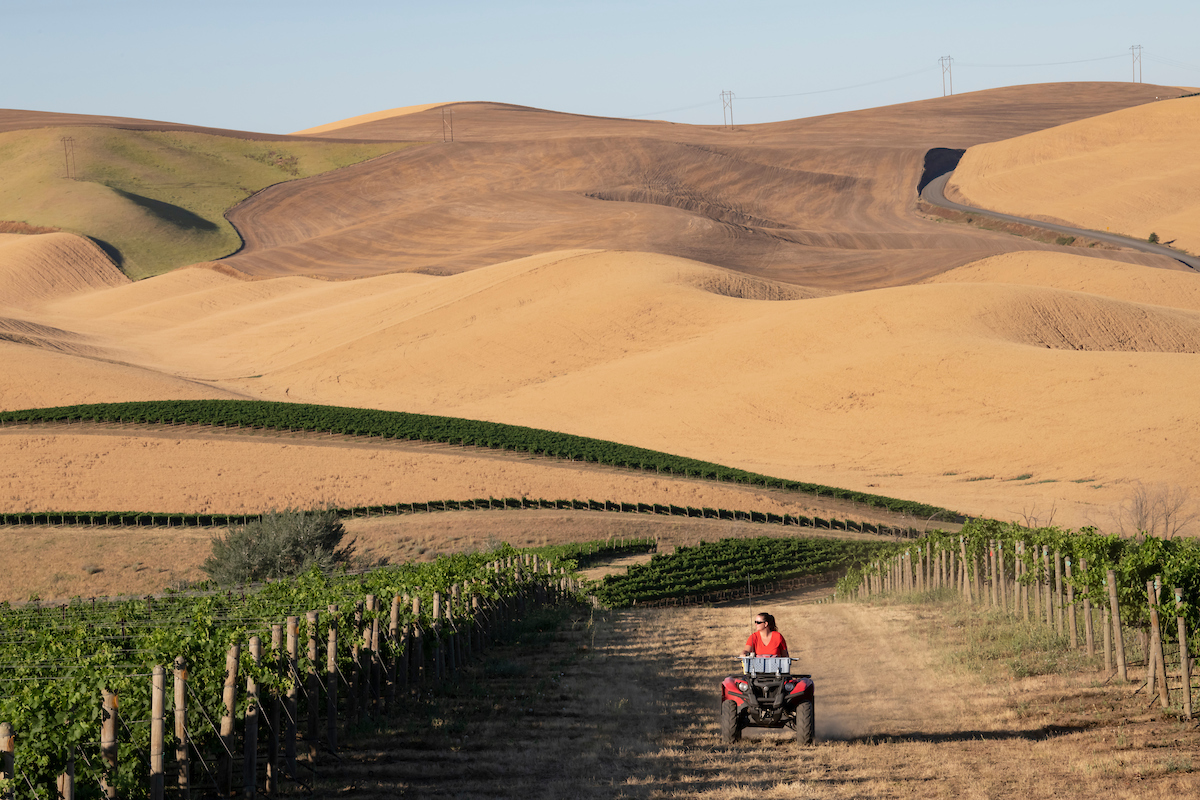
WW: I absolutely want to continue talking about the four-wheeler, but you slid cheerleading in there. Was this something you did passionately as well?
Brittany: I started dancing at the age of two. I ended up dancing for 19 years, 12 of that competitively, and two years was at a semi-pro level. But, I transitioned into the Future Farmers of America (FFA) Program in high school, which put me down a totally different direction. I fell in love with that program. I gained so much experience from the program for the three years I was involved in it. I really regret not getting started in the program my freshman year. It made me want to be an agriculture teacher, because I loved the relationship that I developed with all my teachers.
I ended up going to a community college for three years, working the entire time, because I had to pay for everything myself. I took a few years off after that, because I still didn’t know what I “wanted to do.” I was leaning towards Ag Teacher, but there were no openings at that time, and I didn’t want to go to college and get a degree that didn’t lead me directly into a job, so I managed to climb the management chain at Fred Meyer. I became one of the youngest Managers ever for that store, but I knew I wanted, and needed, to go back to school. I ended up getting a full ride to Pullman, enrolling in their Viticulture and Enology Program, but I wanted to do the V part, not the E part, so created my own degree program in Pullman: IPM, or Integrated Pest Management horticulture program with an emphasis in Viticulture.
I created my own degree program: Integrated Pest Management with an emphasis in Viticulture.—Brittany Komm
WW: Was this program the point of no return for you?
Brittany: More or less, yes. At this time, the industry was flooded with people coming up from California that had graduated with similar degrees looking for jobs. I was approached a couple months before graduation and asked if I wanted to stay around and attend graduate school. At the time, I thought, “Are you kidding me? I am looking forward to graduating. I’m done.” But then they offered to pay. The dean at the time, Dr. Knowles, said, “You have potential. We want you to do a program that you want to do.” They asked me what I wanted to do and I said viticulture. And that’s when I met Dr. Michelle Moyer.
I was Michelle’s first graduate student. When I walked in, she had three projects on the board. I clicked with her right off the bat. My work with ended up being published in the American Journal of Enology and Viticulture. I also have a publication out through WSU extension publications on yield estimation. My journey to Precept was “in the right place at the right time” kind of thing. I was at the point of getting ready to accept a job down in California that I really didn’t want. I wanted to stay in Washington. I felt like I owed it to Washington to stay here since I’d gotten scholarships from the different wine foundations in Washington. I owed it to Washington to stay here and put in some time here. Plus, I like Washington. I didn’t want to leave.
I told Dr. Bhaskar Bondada, one of my committee members, about the job in California. I told him it was an internship. He goes, “No. You are a Master’s Student. You are a scientist. I will not stand for you to go down to California and be an intern.” He hauled me up to the V&E office at WSU Tri-Cities, and within a couple conversations, someone popped their head out of an office and said, “I don’t want to eavesdrop, but I heard you talking that you’re looking for a job in the wine industry on the grape side. A buddy of mine is looking to hire.” He gave me the gentleman’s number, and that’s when I called David Minick. He texted me back a few days later, saying he had a vineyard position to fill. And that’s how it started.
I liked Washington. I didn’t want to leave.—Brittany Komm
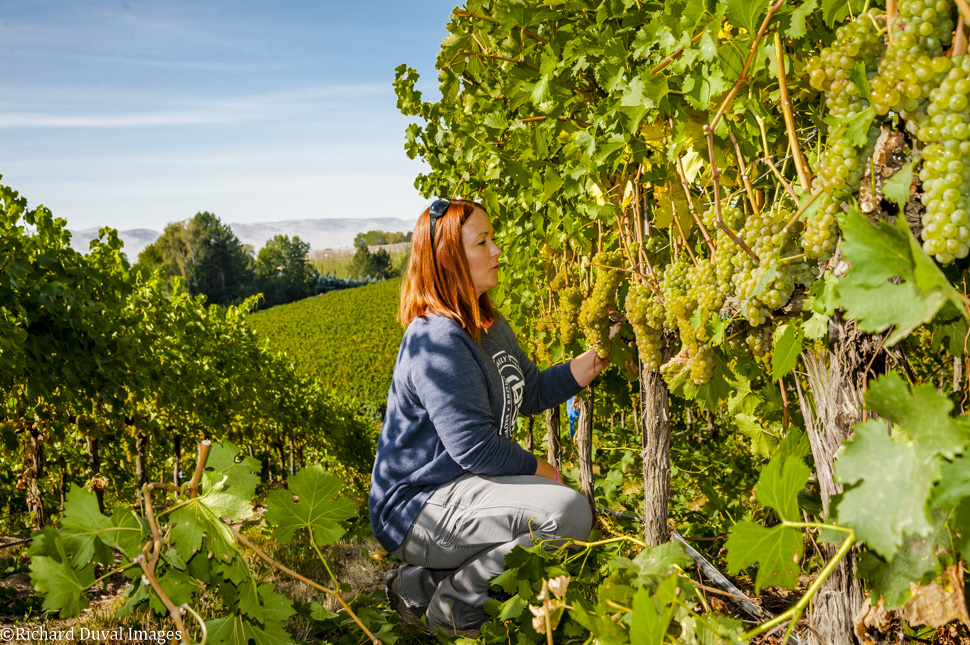
WW: What a journey. Did you have an interview at all with David?
Brittany: We had an informal interview. He asked me why I wanted to get into this industry, and I said, “Because I’m curious. I want to learn. These plants are interesting to me.” I didn’t say anything about the industry being sexy and romantic or that I loved wine. I guess if you’re in the dirt with bugs and spiders then I guess it’s all sorts of sexiness. He later told me he hired me because of the answers I gave. He told me they were genuine and real. He really liked the fact that I didn’t give the answer of I wanted to get into this industry because it is sexy and romantic, he said that is such an overused answer. My answer was one of the most honest he had heard in a very long time. He goes, “The job’s yours if you want it.”
I was hired on as a viticulturist upon graduation with Master’s of Science in 2014, and in 2017, they started noticing that they really needed somebody to manage the Walla Walla vineyard, specifically. Even though it is a beautiful vineyard and the diamond vineyard within our company (farmed 98% for high end premium wines), it is our biggest problem child, unfortunately, just because of Mother Nature. Dave asked if I wanted to manage it. “I think you’re ready,” I remember him saying. “You want that vineyard?” And I said, “Are you kidding me? You’re giving me Precept’s diamond vineyard.”
That’s literally what this vineyard is. This is the king. It’s where Andrew Browne, our founder’s fruit, comes from. “I think you can do it, you are a trained scientist and that is what this vineyard needs, and you love being challenged” he said. “I’ve watched you. It’s yours if you want it.” So in 2018 I officially took over managing the Walla Walla Estate Vineyards. I feel so blessed. They’ve given me a lot of leeway to try stuff out. We were implementing my thesis work my first year of being hired. We’re still implementing it. So, all as well in the neighborhood as they say. Almost all of the fruit being grown on these vineyards is now going into our high end programs and some of our companies most expensive bottles of wine! I guess I must be doing something right, because this was not happening before.
WW: What a journey. The kismet, the synergy. It’s amazing.
Brittany: And now I have a four-wheeler in the back of the truck. I also get to teach, and now, I just give myself goosebumps. I’m getting everything that I wanted just bundled up in one little package. I got the four-wheeler in the truck, I get to play in the vineyards, I’m officially a vineyard manager, and I get to teach people. I couldn’t ask for a more perfect career.
WW: We can’t wait to hear so much more about everything you do, but for now, two final questions. In the rare “me time” that you do have—in those six months outside of the harvest—what does occupy your time? What does Brittany do when she has a few minutes, or moments, that are just hers?
Brittany: I love traveling, so I travel whenever I can. I also love going to Disneyland and Disney World. I can go there and literally feel all the stress and anxiety melt away. I call it “kidulting.” Love going to the Oregon Coast as well. There is something about sand in your toes and saltwater smell that just totally melts all of my stress and anxiety away. I also like to go swimming or play card and board games. Or better yet I love to just sneak naps in.
WW: This is a bit random, but what is your favorite non-musical sound? You can list up to three.
Brittany: Crickets, thunder storms, ocean waves crashing against the rocks. I also have to list this one: the sound of our harvesters or crew picking the grapes. It means rest is coming.
I got the four-wheeler in the truck, I get to play in the vineyards, and I get to teach people. I couldn’t ask for a more perfect career.—Brittany Komm, Waterbrook & Browne Family Estate Vineyards
